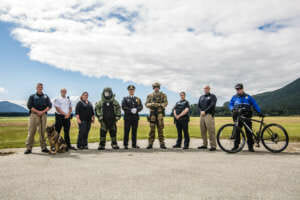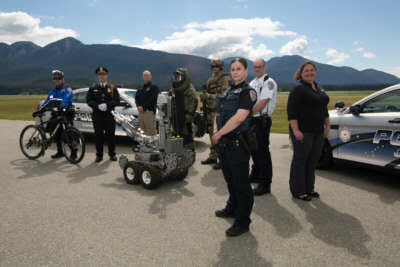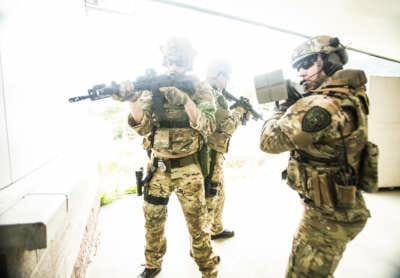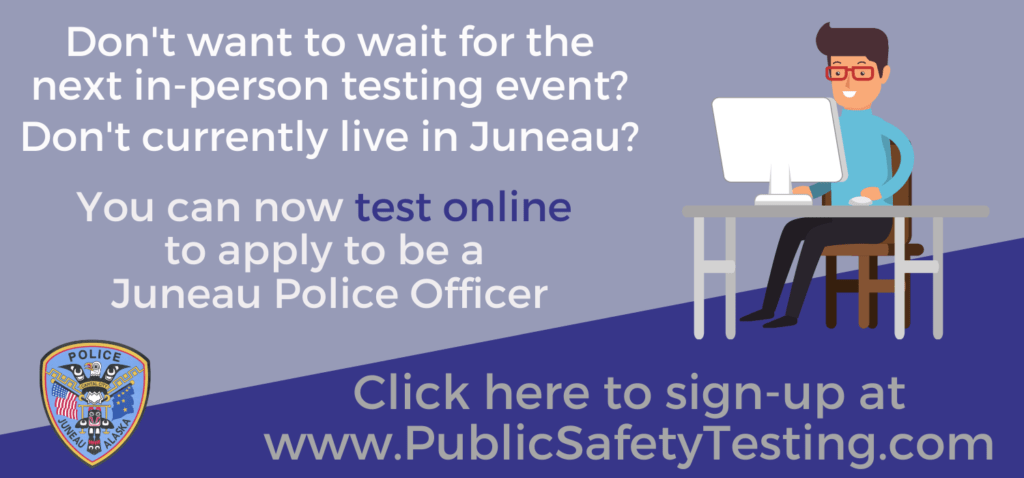Join Our Team
Visit NeoGov for all current JPD openings and to apply
Join the JPD Family
The Juneau Police Department is the second largest municipal police department in the State of Alaska, with an authorized staff of 96 employees. 56 sworn officers and 42 civilian professionals provide unsurpassed service to  the citizens of the City and Borough of Juneau.
the citizens of the City and Borough of Juneau.
JPD professionals are dedicated to fulfilling the Department’s Mission Statement; “In partnership with the people of Juneau, our mission is to make our city a place where people can live safely and without fear.” The mission is accomplished by adhering to the principles contained in the JPD Core Values of Courage, Integrity, Respect, and Service.
JPD offers competitive pay and benefits, but the true advantage is that JPD offers Small Town Policing with Big City Opportunities.
We would love to hear from you if you have the drive, desire, and fortitude to join JPD’s dynamic team. JPD’s main phone number is (907) 586-0600. Ask to speak to someone about recruiting.
Related Links
- CBJ Human Resources Job Announcement Page – Link for more information on all jobs in the City and Borough of Juneau.
- Public Safety Testing
- Job Opportunities | Sorted by Job Title ascending | City & Borough of Juneau Careers (governmentjobs.com)
Dispatcher Recruitment
Remote testing available!

Dispatcher Pay and Benefits:
- $10,000 Signing Bonus
- Starting pay is $29.31 per hour. Higher pay may be approved based on education and prior dispatch experience.
- Shift Differential, Holiday Pay, and Overtime eligible
- Family Medical/Dental/Vision/Life Insurance
- Paid Leave and 12 paid holidays
- State of Alaska Retirement, PERS Tier 4
What it’s like to be a JPD Dispatcher:
There are many satisfying and rewarding aspects of being a Juneau Public Safety Dispatcher. Typical duties include answering questions from the public, managing emergency and non-emergency calls for service via phone or 9-1-1, and dispatching police, fire and emergency medical responders by radio.
Dispatchers regularly make significant contributions to the welfare and safety of their fellow citizens and are a vital link between the public and first responders. Before police or fire responders arrive on scene, dispatchers obtain information about the situation, relaying updates via radio. During medical calls, they provide pre-arrival medical instructions to callers.
Dispatcher Hiring Process:
We have recently streamlined our hiring process and expect applicants to be hired about 4 months after their testing date.
Steps:
- Turn in CBJ application for employment (must be 18 years old and include 2 years of customer service experience)
- Participate in computerized assessment which tests things such as skills in data entry, memory recall, prioritization, spelling, summarization, decision making and reading comprehension.
- Participate in an oral board interview.
- Participate in an observation of the Juneau Communications Center. Sit with an experienced dispatcher to learn more about the job to see if it is right for you!
- Complete background paperwork and interviews.
- Complete psychological paperwork and interview with psychologist.
- Complete controlled substances screening.
Dispatcher Training Process:
The first week on the job typically involves classroom training and orientation to a variety of computer software programs and basic call taking skills. The following week, students begin using those skills live in the Communications Center with constant guidance and support from a Communications Training Officer (CTO). The training program is broken into 5 distinct phases:
- Phase 1 – Computers and Call taking:
- Training week 1 classroom
- Training week 2 – 7 on the job training (OJT)
- Phase 2 – Basic Radio Skills:
- Training weeks 8 – 11 OJT
- Phase 3 – Emergency Medical Dispatch / Fire Radio / E911
- Training week 12 classroom
- Training weeks 13 – 17 OJT
- Phase 4 – Radio Proficiency / Primary JPD Radio
- Training weeks 18 – 21 OJT
- Phase 5 – Dispatch Proficiency / Final Sign Off
- Training week 22 OJT
The timeframe above is a guideline. Each person brings different experiences and skill sets. The time in each phase is monitored and adjusted accordingly.
Public Safety Call Taker
Call Taker Pay and Benefits:
- Starting pay $24.52 – $25.65 per hour (DOQ)

- Shift Differential, Holiday Pay, and Overtime Eligible
- Family Medical/Dental/Vision/Life Insurance
- Paid Leave and 12 Paid Holidays
- State of Alaska Retirement, PERS Tier 4
About our Call Taker job:
- Works limited shift work with a focus on days and evenings
- Answers call for service from the public
- Provides information to the public
- Critical link between citizens and public safety services
- Work often performed under stressful demands for speed and accuracy
- On-the-job training provided
What it’s like to be a Public Safety Call Taker:
Communications Center staff field 7,000 to 12,000 business-line phone calls per month. Twenty calls per hour – not including 911 calls – is common during a dayshift. Call takers will work with dispatchers during peak times of day to assist with the heaviest phone call volume. The goal of the positions is to provide better service to the public and responders by answering many of these calls for service.
Common calls for service that call takers will field include theft of property, abandoned vehicles, parking complaints, bear activity, motor vehicle accidents, welfare checks, suspicious activity, trespassing, burglaries, alarm activations, and general requests for assistance or information.
Call Taker Hiring Process:
Once an applicant has taken the initial test, it takes approximately 4 months to complete the remainder of the process before their hire date.
Steps:
- Turn in CBJ application for employment (must be 18 years old, high school graduation or equivalent, and include 12 months of customer service and data entry or reception/administrative experience).
- Participate in computerized assessment which tests skills in data entry, memory recall, prioritization, spelling, summarization and reading comprehension.
- Participate in an oral board interview.
- Participate in an observation of the Juneau Communications Center. Sit with an experienced dispatcher to learn more about the job to see if it is right for you!
- Complete background paperwork and interviews.
- Complete final psychological paperwork and interview with psychologist.
- Complete controlled substances screening.
For more information on the call taker positions, call Public Safety Manager Erann Kalwarra at 907-500-0722.
Community Service Officer 
Community Service Officer Pay and Benefits:
- Starting pay $29.82 – $30.88 Hourly
- Hours Per Week: 40
- Family Medical/Dental/Vision/Life Insurance
- Paid Leave and paid holidays
- State of Alaska Retirement, PERS Tier 4
What it’s like to be a JPD Community Service Officer:
Being a Community Service Officer (CSO) offers diverse and challenging duties yet offers rewarding work as a public servant. CSOs must enjoy interacting with coworkers, as well as, the public while being both a self-starter and a team player. CSOs must be able to multi-task and change duties throughout the day. CSOs are subject to all types of weather conditions, as well as noisy conditions (sirens, radio traffic, telephones, alarms). CSOs must be able to learn, follow, and apply JPD rules/policies/ procedures, and CBJ ordinances. CSOs must be able to learn and easily navigate numerous computer programs throughout their shift; must read, understand, and clearly communicate orally and in writing the English language; must be able to physically move traffic barricades and various objects weighing 40 pounds or less. CSOs must be remain calm, decisive, and diplomatic during stressful or volatile circumstances.
Community Service Officer Hiring Process:
Each step in the hiring process needs to be completed before advancing to the next step.
Steps:
- Apply through City and Borough of Juneau: www.joinjpd.com
- Complete and pass the written test.
- Interview Process at JPD, answer questions from a panel of three JPD supervisors.
- Pass a detailed background investigation. A typical background takes approximately four weeks to complete.
- Complete final psychological paperwork and interview with psychologist.
- Pass a medical exam.
- Pre-employment drug testing.
Community Service Officer Training:
After hire, the CSO receives initial in-house training known as a “mini academy” and then is assigned a Field Training Officer for 560 hours of training related to the job duties and activities performed in the field. After successful completion of training, the CSO will conduct patrols and job duties on their own supervised by the CSO Lead. The CSO work has been described in the past as the “best of both worlds”, meaning that the CSO gets to work in a role similar to a Police Officer, but has almost all weekends off and rarely works night shifts. There is contact with the community in a service-centered role for the City of Juneau and helps JPD achieve their mission statement. JPD is looking for candidates who personify the JPD of Core Values, Courage, Service, Integrity, and Respect. Are you one of those people?
For those out there who might want to be a Police Officer, the CSO duties are a great place to learn and build skills. Who knows, maybe you will want to stay in the role!
Entry Level Police Officer
Police Officer Pay and Benefits:
- $25,000 signing bonus-$12,500 upon hire and $12,500 upon successful completion of training
- Starting pay $38.69 – $40.04 per hour.
- Starting Salary Range $78,894 to $81,640
- Shift Differential, Holiday Pay, and Overtime eligible
- Family Medical/Dental/Vision/Life Insurance
- Paid Leave and 12 paid holidays
- State of Alaska Retirement, PERS Tier 4
What it’s like to be a JPD Police Officer:
Being a JPD Police Officer is an exciting career choice that offers individuals a chance to make a true difference for the City and Borough of Juneau. Most calls for service are handled by Patrol, which is divided into five teams that work a combination of 10 and 12 hour shifts. Staffing is geared toward peak times, which tends to be on weekend nights. Calls for service occur at a rate that allows officers to remain busy, but also has unallocated time where officers can engage in proactive policing techniques.
The CBJ has approximately 32,000 residents and is geographically isolated from other communities. The next larger communities are Anchorage at 500 miles to the Northwest, and Seattle at 900 miles to the South. As a result, JPD has to be more self-sufficient than most departments in the lower 48 states.
In addition to Patrol, officers have an excellent chance of working either a lateral assignment or being trained for a special ancillary duty. Lateral assignments include Investigations, Narcotics Enforcement, Airport Team, Down Town Walking/Bike Patrol and School Resource Officers. Ancillary duties include a SWAT Team, Crisis Negotiators, Explosive Ordnance Disposal Team, Accident Investigators, and many more.
Police Officer Hiring Process:
Each step in the hiring process needs to be completed before advancing to the next step.
Steps:
- Sign up for written testing through Public Safety Testing at www.publicsafetytesting.com.
- Physical Test. See Fitness Standards page for details.
- Oral Boards. Complete set questions by a panel of three JPD supervisors.
- Pass a detailed background investigation. A typical background takes approximately four weeks to complete.
- Polygraph examination.
- Complete psychological paperwork and interview with psychologist.
- Submit to medical examination by a licensed physician of your choice.
- Pre-employment drug testing.
Police Officer Training:
After being sworn in, newly hired officers typically receive 4-6 weeks of in-house training. This initial training covers Arrest Control Tactics, Less Lethal Systems, and Firearms Training to name a few. Initial training is designed to familiarize new officers with JPD practices before leaving for the Academy.
Entry level police officers are required to attend the State of Alaska, Department of Public Safety Training Academy held in Sitka. The Academy is 17 weeks long and runs twice a year, in the spring and in the fall. The Academy is a live-in setting with dorm rooms and meals. The cost of the Academy is covered by JPD. Officers also receive a salary while attending the Academy.
After completing the Academy, officers begin Field Training. The Field Training program is 14 weeks long. Officers typically spend four weeks with three different FTOs, followed by a two-week testing and evaluation phase. After completing Field Training, officers are assigned to a patrol team.
Yearly training is an important aspect of maintaining skills. JPD officers are scheduled for 80 hours of annual training that covers a wide variety of topics. Officers working lateral assignments, or with specialty ancillary duties, receive additional annual training.
Lateral Police Officer

We have many successful JPD officers who started their careers with other agencies. Do you have the training and experience to join these fine officers in serving the citizens and visitors of Alaska’s Capital City?
Police Officer Pay and Benefits:
- $30,000 Bonus – $15,000 at hire and $15,000 upon successful completion of training
- Starting pay $40.04 – $53.75 per hour based on experience.
1 year – $40.04 per hour
2 years – $40.64 per hour
3 years – $42.04 per hour
4 years – $43.51 per hour
5-6 years – $45.04 per hour
7-8 years – $46.84 per hour
9-10 years – $48.71 per hour
11-12 years – $50.66 per hour
13 years or more – $52.70 per hour
- Yearly Base Starting Range $83,283.20-$111,800
- Shift Differential, Holiday Pay, and Overtime eligible
- Family Medical/Dental/Vision/Life Insurance
- Paid Leave and 12 paid holidays
- State of Alaska Retirement, PERS Tier 4
Lateral Officer Hiring Requirements:
To qualify as a lateral applicant, officers must be able to meet the following criteria:
Alaska Lateral Applicants:
- Serve within any police/law enforcement agency within the State.
- Cumulative related service in Alaska must include a minimum of one year of uniformed patrol as a commissioned law enforcement officer (DPS Academy Certified)
- And, validated evidence of successful completion of a related training academy certified by the appropriate state, federal or local regulatory or oversight agency.
Outside Lateral Applicants:
- Service in a city of at least 5,000 population, as defined by the U.S. Office of Management and Budget. Or, service in a city that is part of a Metropolitan Area with at least 25,000 population as defined by the U.S. Office of Management and Budget.
- Cumulative-related service must include a minimum of one year of uniformed patrol duty as a commissioned law enforcement officer,
- And, validated evidence of successful completion of a related training academy certified by the appropriate state, federal or local regulatory or oversight agency.
“Good Standing” – A current or former Police Officer who may be employed or re-employed to a full-service Police Department. This includes currently employed Police Officers who are able to discharge all their duties without any administrative, mental, or disciplinary hindrance. In addition, before retirement, was authorized by law to engage in or supervise the prevention, detection, investigation, or prosecution of, or the incarceration of any person for, any violation of law, and had statutory powers of arrest. This does not include Police Officers who resigned in lieu of discipline or that may have led to discipline.
NOTE: Military Police, Detention/Correction Officer, Reserve Officer, Park Ranger/Park Police, Capital Police, Detention/Jail/Court Security Sheriff’s Deputy or Marshall, Special District Police, Railroad Police, Village Public Safety Officer, and federal law enforcement personnel will NOT be considered as previous related experience.
Lateral Officer Hiring Process:
The lateral officer hiring process differs from the entry-level process in two ways. First, lateral officers do not take the initial officer testing through Public Safety Testing. Lateral officers submit an application as the first step. If the lateral applicant meets the lateral requirements, they are invited to proceed with the testing process.
Second, the remaining steps of the testing process are the same, but no fitness test, with an accelerated timeline. This is because lateral officers do not have to attend the full Alaska Department of Public Safety Training Academy.
Each step in the hiring process needs to be completed before advancing to the next step.
Steps:
- Submit an application to the CBJ.
- Oral Board. Respond to questions by a panel of JPD personnel.
- Pass a detailed background investigation. A typical background takes approximately four weeks to complete.
- Polygraph examination.
- Complete psychological paperwork and interview with psychologist.
Lateral Officer Training:
After being sworn in, newly hired lateral officers receive in-house training to prepare them for field training. This process varies but it typically takes 4-6 weeks. Initial training covers topics of Arrest Control Tactics, Less-Than-Lethal systems, Firearms Training, Laws of Arrest, and Search and Seizure to name a few. Initial training is designed to prepare the lateral officer for field training.
The Field Training program is 14 weeks long. Officers typically spend four weeks with three different FTOs, followed by a two-week plain clothes phase. After completing Field Training, officers are assigned to a patrol team.
Lateral officers from outside of Alaska will be required to attend a two-week recertification at the Alaska Public Safety Academy. Home – Academy – Comm – Alaska Department of Public Safety
Yearly training is an important aspect of maintaining skills. JPD officers are scheduled for 80 hours of annual training that covers a wide variety of topics. Officers working lateral assignments, or with specialty ancillary duties, receive additional annual training.
Assignments and Ancillary Duties
 Due to the CBJ’s geographic isolations, the Juneau Police Department does not have the ability to easily rely on neighboring agencies for assistance. As a result, JPD strives to be as self-sufficient as possible. Here is a list and brief description of some of JPD’s potential lateral assignments and ancillary duties.
Due to the CBJ’s geographic isolations, the Juneau Police Department does not have the ability to easily rely on neighboring agencies for assistance. As a result, JPD strives to be as self-sufficient as possible. Here is a list and brief description of some of JPD’s potential lateral assignments and ancillary duties.
Potential Lateral Assignments:
- Criminal Investigations Unit – The CIU is staffed by five detectives and a sergeant. Two detectives specialize in crimes against people, two detectives specialize in crimes against property, and one detective works both people and property cases.
- Metro Drug Unit – Metro Drug is staffed by two officers specialize in conducting investigations that deal with illegal narcotics. The two narcotics investigators often work closely with the detectives in the CIU.
- School Resource Officers – One to two officers work with the schools to teach prevention techniques to students. School Resource Officers (SRO) are DARE certified but teach classes that include Stranger Danger, Pedestrian Safety, Bicycle Safety, and many more classes. SROs try to maintain a presence in all of Juneau’s Schools, which includes two high schools, two middle schools, six elementary schools, a Montessori school, and a home school network.
Potential Ancillary Duties:
This list is not all inclusive and only highlights some of the major ancillary duties.
 Crisis Negotiations Team – CNT is comprised of five officers. Each CNT member receives the FBI 40 hour basic negotiator training. Ongoing training consists of monthly in-house training. CNT works closely with the JPD SWAT Team.
Crisis Negotiations Team – CNT is comprised of five officers. Each CNT member receives the FBI 40 hour basic negotiator training. Ongoing training consists of monthly in-house training. CNT works closely with the JPD SWAT Team.- Explosive Ordnance Team – EOD is comprised of four officers. Each EOD member receives the six weeks of initial training through the United States Army and funded by FBI. EOD members also receive ongoing monthly in-house training.
- Instructors – JPD believes in establishing in-house instructors to provide training to the rest of the department. JPD instructors include Arrest Control Tactics, Cultural Diversity, Domestic Violence, DWI Enforcement, Firearms Instructors, Less Lethal Devices, Stop Sticks, Emergency Vehicle Operations, Radar/Lidar Enforcement, to name a few.
- SWAT – JPD fields a SWAT Team comprised of 10 officers. Depending on their specialty, SWAT members receive individual training as well as ongoing monthly in-house training. SWAT works closely with the JPD CNT Team.
Officer Fitness Standards
 |
 |
JPD Fitness Room with direct access to the locker rooms.
The Juneau Police Department has a gym that is available to all JPD employees. None of the equipment in the gym was purchased using taxpayer dollars. All of the equipment in the gym was purchased by JPD employees through a voluntary program that created the JPD Fitness Committee.
Police Officer Hiring Standards
There are four events that test an applicant’s level of physical fitness.
The minimum acceptable standard for each event is as follows:
- 300 Meter Run = 77 seconds
- Push-Ups = 21 repetitions
- One Minute Sit-Ups = 15 repetitions
- 1.5 mile run = 17 minutes, 17 seconds
Applicants who fail the physical ability test will have one opportunity to retake the test within 90 days of the written exam date.
Fit for Duty Pin:
There are not any ongoing requirements for police officers to maintain fitness standards after being hired. The Department encourages officers to maintain fitness standards through voluntary Fit for Duty testing. Officers who pass the Fit for Duty testing are allowed to wear a Fit for Duty pin on their uniforms. The Fit for Duty standards are as follows:
- 300 Meter Run = 54 seconds
- Push-Ups = 32 repetitions
- One Minute Sit-Ups = 37 repetitions
- 1.5 mile run = 12 minutes, 51 seconds


